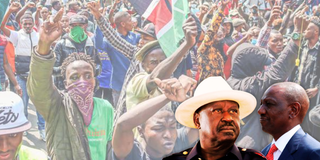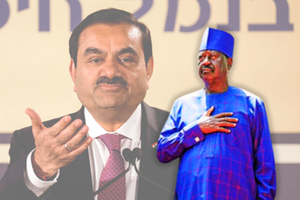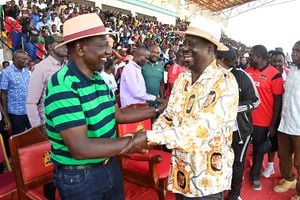
Raila Odinga denied that he had a 'handshake' deal with President William Ruto and that he had benefited from the Gen Z protests over the Finance Bill 2024, which he said was necessary to prevent the country from descending into chaos.
Opposition leader Raila Odinga has denied reaching a 'handshake' deal with President William Ruto, saying it came in handy to prevent the country from sliding into anarchy following massive Gen Z protests that led to bloodshed.
A 'handshake' refers to a political truce similar to Mr Odinga's pact with former president Uhuru Kenyatta, which ended months of anti-government protests following the disputed 2017 presidential election.
Mr Odinga has faced accusations that he benefited from the sacrifices of young Kenyans who staged protests against Finance Bill 2024 in June and has a stake in President Ruto's Kenya Kwanza government.
But in an interview on Citizen TV on Friday night, the ODM leader dismissed as a "useless allegation" that he was a beneficiary of the Gen Z protests.
“That has been a useless allegation made by the media. I’ve not benefitted. What happened was the need to involve the larger society in the governance and if we could give President Ruto some people from our party.
“I consulted with my other colleagues in the Azimio coalition and some were ready while others were not. I then seconded some of our people to the government to work. But it was not like forming a pact or a coalition because we did not negotiate on the basis of a coalition,” Mr Odinga explained.
He continued: "So these people were basically just hired on merit and they had to relinquish their positions in the party but not their membership. They remain members of the ODM party.
Mr Odinga was referring to the inclusion of some senior ODM leaders in President Ruto's 'broad-based cabinet' in July.
They are; former ODM deputy party leaders Hassan Joho and Wycliffe Oparanya, former ODM National Chairman John Mbadi and ex-Secretary of Political Affairs Opiyo Wandayi as well as former member of the party's elections board Ms Beatrice Askul.
Mr Joho was named Cabinet Secretary (CS) for Mining, Blue Economy and Maritime Affairs, Mr Oparanya as CS for Cooperatives and MSME Development, Mr Mbadi was named National Treasury and Economic Planning CS, Mr Wandayi as CS for Energy and Petroleum while Ms Askul was named CS for East Africa Community (EAC), ASALs and Regional Development.
In addition, President Ruto recently appointed more Mr Odinga allies to plum state positions, even as he brought in allies of former President Kenyatta.
Prof Adams Oloo, Mr Joe Ager and Dr Sylvester Kasuku - all allies of Mr Odinga - are now part of President Ruto's Council of Economic Advisers.
Prof Oloo will be the adviser on strategy and communication, while Dr Kasuku will be in charge of governance. Mr Ager will be the Secretary for Governance.
Mr Ager and Prof Oloo were part of the team that brokered a truce between President Ruto and the ODM leader that led to opposition politicians joining the Cabinet.
Prof Oloo has been an adviser to Mr Odinga for many years and played a key role in his presidential campaigns, as well as serving on the technical team of the National Dialogue Committee.
Dr Kasuku served as Secretary for Infrastructure and the Lapsset Corridor Project in the then Prime Minister's Office.
However, in his interview on Friday, Mr Odinga denied having a pact with President Ruto, referring to the June protests, which he said had the potential to plunge the country into anarchy.
“We did not help to steady a sinking ship. What you don’t realise is that there was a very high likelihood of the country degenerating into anarchy which could have been very dangerous.
“You can see what happened in Egypt and Libya during the Arab Spring. If we were not careful that arrangement could easily have happened here,” Mr Odinga said.
He went on to deny having a pact with President Ruto, also exonerating Mr Kenyatta from such claims after his allies were also recently included in the cabinet.
"I did not have a handshake with Ruto because we did not agree on any written document. The handshake I had with (former president) Mwai Kibaki and then later with Uhuru Kenyatta - we signed an agreement that ended with the production of a report. We went to the public in front of the President's office and we had a formal handshake with Uhuru, as we had done with Kibaki,” the ODM leader said.
He continued: "Uhuru is a former president while Ruto is a former DP and they were in government until election day. Kenyans know exactly what happened in the elections and they were in the same government until the last minute. Uhuru even went to the swearing-in ceremony and handed over power to Ruto. So people misunderstand the word handshake".
He said Mr Kenyatta only "greeted Ruto" but never said it was a handshake that they would work together.
"In terms of bringing on board perceived allies of Uhuru, President Ruto had said he wanted to form a government that was representative of the rest of the country.
"He had started when he got some people from ODM and now some from Jubilee. This is not a handshake, this is just broadening his government," the former Prime Minister added.
He continued: "If there is a handshake on the basis of things that have been negotiated and agreed upon, it will be formally announced that we have now come to an agreement and this is what we are going to implement, but for now it's just speculation."
Mr Odinga and President Ruto have shown a degree of camaraderie, with the ODM leader's allies in government pledging to support the leader's re-election campaigns.
ODM Director of Elections Junet Mohamed, a close ally of Mr Odinga, has also publicly stated that while the party remains in opposition, "we cannot just oppose the government's plans for the sake of opposing them".
Interim ODM leader Prof Anyang' Nyong'o, who has been elevated to the post as Mr Odinga focuses on his African Union Commission (AUC) chairmanship campaigns, has indicated that the party is keen to forge "strategic partnerships".
“…as a political entity, we understand the value of strategic partnerships. From time to time, we may choose to form alliances and coalitions with other parties or groups that align with our objectives and vision for Kenya.
"These partnerships are not acts of subservience but deliberate efforts to strengthen our resolve to achieve our primary goal: to capture political power to transform the lives of Kenyans," Prof Nyong'o said in a recent statement.
Mr Odinga, however, has denied that his AUC bid had anything to do with supporting President Ruto's government.
Mr Odinga is up against Djibouti's Foreign Minister Mahmoud Ali Youssouf and former Madagascar Foreign Minister Richard James Randriamandrato, with whom they participated in the Mjadala Afrika debate on December 13.
"It is a three-horse race between Kenya, Djibouti and Madagascar. Maybe the best horse will win," he said during the interview on Friday.
Mr Odinga noted that he will accept the outcome of the February 2025 election, but added that he is in the race to win and not to lose.
"If we win, very good for us. If we lose, so what! We are here in Kenya, there will basically be other things for us to do. So we are not worried about losing. Asiyekubali kushindwa siye mshindani. But we are not competing to lose but to win," he said.
He urged President Ruto's administration to ensure that it delivers on its pre-election promises to make life easier for Kenyans.
"The government has a responsibility to make life easier for the people. At the same time, it has a responsibility to initiate certain projects that will make life easier for the people and create wealth for the nation.
"So it's a challenge to inflict pain on the people and at the same time make life easier for the people. I'm asking the government to take a very comprehensive look at what's happening because people are suffering because the cost of living is very high."
He noted that there are ways to ease the living standards of Kenyans "but still be able to generate enough revenue to provide certain services to the country".
He said it was not the first time Kenyans had faced economic challenges.












